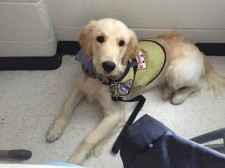Special Delivery for West Fargo, North Dakota Child

West Fargo, North Dakota, September 24, 2016 (Newswire.com) - On Wednesday, September 28, Lucille Wirtz of West Fargo, North Dakota, will be welcoming into her home and heart a Golden Retriever named “Toby.” The dog is being provided by Service Dogs by Warren Retrievers, a non-profit organization based in Virginia, with a mission to provide specially-bred and trained dogs for adults and children with invisible disabilities like Diabetes, PTSD, Seizure Disorders, or in the case of “Lucy”—Autism Spectrum Disorder. Service Dogs by Warren Retrievers, “SDWR” has over 500 service dogs working across the US and around the globe. SDWR is currently serving almost 1,000 families.
Toby has already received thousands of hours of training as Autism service dog through SDWR’s puppy raiser training program where volunteers raise puppies in training for about a period of one year and then through the foundation and skill set training provided through SDWR trainers at the facility in Virginia. Toby will continue to learn under the careful guidance of a certified trainer from SDWR and through the rapport he develops with Lucy and her parents, Michael and Ruth at their home in West Fargo.
"Lucy is oversensitive to noises, changes in her routine, and suffers from sleep disturbance—something many children with Autism experience."
Michael Wirtz, Father of Lucy Wirtz
Lucy, just 4 years old, and has had to face the daily challenges associated with Autism Spectrum Disorder. “Lucy is oversensitive to noises, changes in her routine, and suffers from sleep disturbance—something many children with Autism experience,” states her dad, Michael. “We also find that Lucy will wander off whether she is in the front yard or in a store,” he adds, “and Lucy experiences overload because she is frustrated in her lack of ability to verbally communicate.”
Autism Spectrum Disorder does hinder a person’s ability to communicate and interact socially. New scientific research studies into Autism therapy provide positive evidence of the difference a service dog can make. Dan Warren states, “The studies showed children were more talkative and socially engaged when their service dog was present. Children experienced fewer sensory overloads, ‘meltdowns,’ smiled more frequently, experienced better sleep patterns, and had less frustration when around their service dog.”
Autism service dogs are also trained to redirect away from repetitive and sometimes harmful behaviors. One of the main goals when training an Autism service dog is the need to keep a child safe. When the family goes out, the child may literally be tethered to the dog, or the dog will use its natural herding and blocking abilities to keep him or her from running off or getting hurt. According to Mr. Warren, “the studies further found that safety aspect was a huge relief for families as parents’ anxiety over their child can lead to social isolation.”
Lucy’s mother agrees that the Autism diagnosis has changed the family’s ability to live and interact socially. “It has changed the way we deal with going out in public. We limit our trips to stores and rarely eat out together. We currently take turns going, leaving one of us at home with Lucy,” says Ruth.
Now with the arrival of Toby, Lucy and her parents along with siblings Lillian and Eliza will have yet another tool, a four-legged one that has received training to assist Lucy to live a happier and more enriching life. Since Toby is a service dog and covered under laws in accordance with the Americans with Disabilities Act, he will be able to accompany Lucy everywhere—from school to restaurants, shopping and even trips to the doctor. Toby will keep Lucy safe as well as help her cope with the sensory overload challenges that come with an Autism diagnosis.
Toby will continue to work with the SDWR trainers in the Wirtz home to learn new skills to assist Lucy as well as to achieve public access certification. Certification must be achieved by Toby and his handler—in this case, Lucy’s parents. Dan Warren is quick to point out that, “all the incredible services these dogs can provide are through progression, hard work and dedication of the organization and the family who must work together to build on training foundations and fundamentals. This is about an 18-month program for follow up and customization training.”
What sets SDWR apart from other non-profit service dog organizations are the customized training methods and SDWR matches dogs to their “person.” According to Dan Warren, “that important bonding time between dog and person can begin to happen right away. For nearly a decade we’ve been utilizing this method of dog placement and we’ve achieved amazing results.”
About Service Dogs by Warren Retrievers
Service Dogs by Warren Retrievers is a non-profit organization based in Madison, Virginia, and relies on donations to help the Organization in its mission, “Until there’s a cure…there’s a dog.” To make or donation or learn more about SDWR, please visit the website, http://www.sdwr.org. To learn more about Autism Service Dogs visit http://www.sdwr.org/service-dogs/autism/. To find out how you can volunteer as a puppy raiser visit http://www.sdwr.org/volunteer-opportunities/.
Source: Service Dogs by Warren Retrievers
